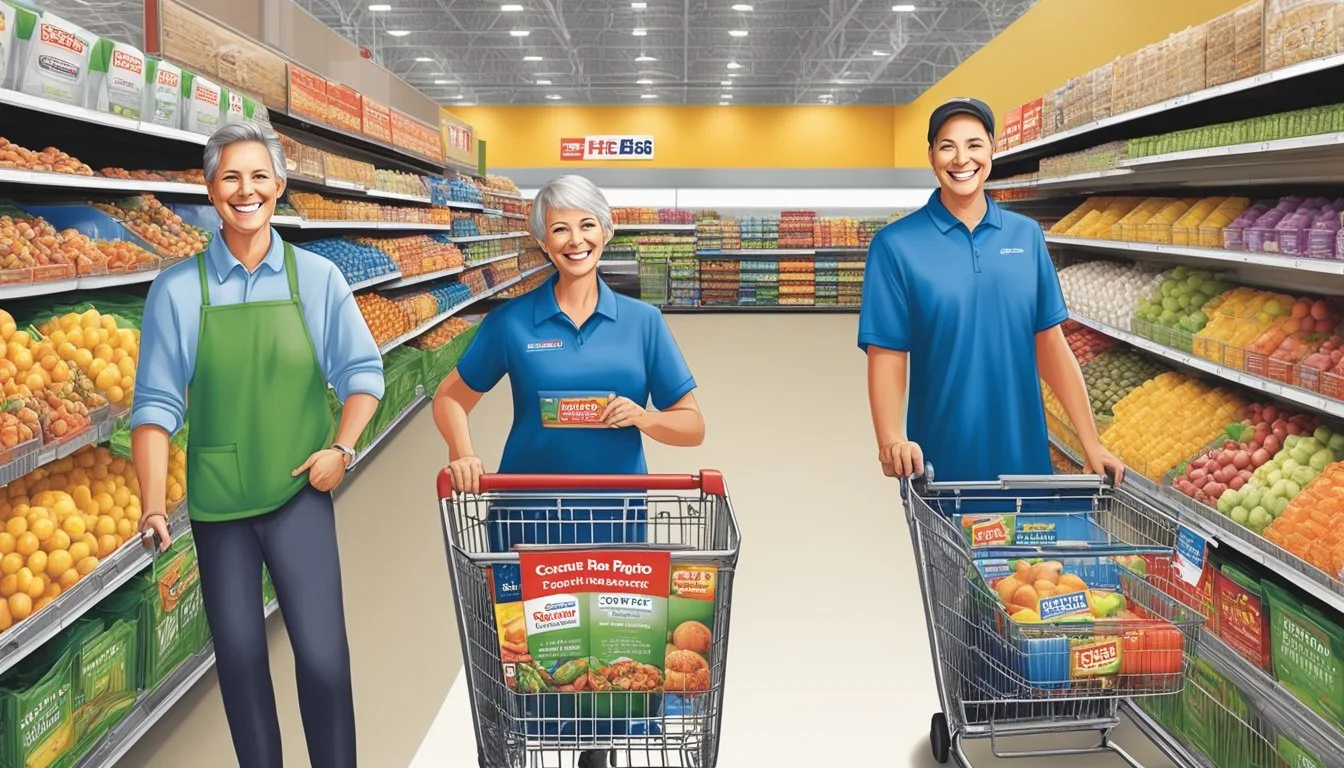Costco vs H-E-B
Comparing Prices, Quality, and Services
When shopping for groceries, consumers often weigh their options among various stores, each with its own distinct offering and pricing strategy. Two notable contenders in the grocery store landscape are Costco and H-E-B. Costco, a membership warehouse club, is renowned for its bulk items, competitive pricing, and limited selection of products focusing on value for money. H-E-B, a regional supermarket chain with its strong Texas roots, offers a more traditional grocery experience with a wider variety of individual and family-sized products tailored to the local community's preferences.
The choice between Costco and H-E-B can hinge on several factors including budget, family size, and shopping habits. Costco's model is designed to provide considerable savings for its members, especially those purchasing for large families or businesses that can store and consume products in bulk. Conversely, H-E-B focuses on providing a more curated selection, with attention to local produce and a broader range of national and store-brand products. Both stores have established their appeal through dedicated customer bases and have earned high scores in customer satisfaction.
While both Costco and H-E-B come with unique advantages, shoppers' preferences can greatly influence which store is better suited for their grocery needs. Those who prioritize price over product variety may lean towards Costco, while shoppers looking for regional specialties and a more traditional shopping experience might favor H-E-B. A detailed comparison of these two retail giants is essential for consumers seeking to make an informed decision on where to invest their grocery budget.
Historical Overview and Market Presence
In the competitive landscape of grocery retailers, Costco and H-E-B stand out for their distinctive evolutionary paths and market presence. Each has carved a niche in the supermarket industry, achieving significant market share and customer loyalty through unique business models and brand strategies.
Costco's Evolution
Costco began operations in 1983 in Seattle and quickly became a leader in the membership warehouse sector. Its model revolves around providing bulk products at low prices, primarily to members. The company has diversified its departments to include electronics, apparel, and even a food court among its offerings. A significant contributor to its growth is the Kirkland Signature brand, a store-owned label that offers quality comparable to national brands at a fraction of the cost. Costco's market presence is substantial, with hundreds of stores operating across the globe.
H-E-B's Growth
H-E-B, a Texas-based supermarket chain established in 1905, has developed a robust presence in the U.S. grocery market, particularly in Texas. Known for offering a unique selection of groceries, electronics, and home goods, H-E-B has carved out a top position in the market by continually meeting the regional preferences of its customer base. Its persistent focus on community and localized product offering has led to a strong connection with shoppers.
Comparing Market Share
Comparing their market share finds H-E-B and Costco in direct competition with giants like Walmart and Target, yet each maintains a unique appeal. Costco's large-scale warehouse model and aggressive pricing, through initiatives like its gas stations, have allowed it to capture a broad cross-section of consumers. On the other hand, H-E-B's personalized approach has kept it on top of the regional market and even led it to be recognized multiple times as a top U.S. grocery retailer. Both companies have seen significant sales growth, with Costco reaching an annual revenue of over $226 billion in 2022 and H-E-B making history by holding steady as a top U.S. grocery retailer in consumer rankings. While Costco has a broader international reach, H-E-B's targeted growth within its regional stronghold provides a counterbalance, showcasing two distinct paths to success in the grocery industry.
Membership and Pricing Models
When comparing Costco to H-E-B, membership requirements and pricing structures are pivotal for consumers. Shoppers must navigate the nuances of each store's model to determine which aligns best with their shopping habits and budgets.
Membership Requirements
Costco operates on a membership-based model. Customers are required to purchase an annual membership to shop in-store or online. Pricing for the basic annual membership starts at $60. Costco's model allows access to wholesale prices, exclusive deals, and a range of other services such as travel and insurance discounts.
In contrast, H-E-B does not require a membership for shopping. Accessibility to H-E-B's products is open to all, with no upfront fee, making it a go-to option for individuals who prefer not to commit to a subscription or annual fee for their grocery shopping.
Price Comparison
At Costco, the bulk-purchase concept is a key driver of its competitive pricing. By selling products in larger quantities, Costco can offer lower per-unit prices. This model often results in significant savings for consumers willing to buy in volume.
H-E-B boasts competitive pricing as well, with a focus on everyday low prices and weekly specials. While pricing can be slightly higher for select items in comparison to Costco, H-E-B caters to varied purchase sizes and quantities, offering regular-sized products rather than solely bulk items.
Item Costco Price H-E-B Price Bread $4.75 $5.98 ... ... ...
Impact of Inflation on Pricing
Inflation impacts both stores but in different ways. Costco's bulk-buying strategy may mitigate some inflation effects, as purchasing larger quantities can lock in lower prices for its members. Additionally, membership fees provide a revenue stream that can help Costco absorb some costs without passing them entirely to the consumer.
H-E-B responds to inflation by offering a range of store brands that often come at a lower cost compared to name brands. Sales and discounts are strategically used to provide value to consumers, even as market prices fluctuate. H-E-B has a strong regional presence, which may offer some buffer against inflation through local sourcing and distribution efficiencies.
Product Selection and Quality
When comparing Costco and H-E-B, a key distinction lies in their approach to product selection and the quality offered under their respective brands. Costco is renowned for its Kirkland Signature label, while H-E-B boasts a variety of store brands tailored to different shopper needs.
Private Labels and Brand Names
Costco is synonymous with its private label, Kirkland Signature. This brand offers a wide range of products known for their quality that often match or exceed the leading national brands. H-E-B also offers its own private labels, which include H-E-B Organics and the premium H-E-B Select Ingredients. Both retailers provide a mix of their own store brands and well-known brand names, giving customers a variety of choices.
Kirkland Signature: Renowned for quality across diverse categories.
H-E-B Private Labels: Includes organic options and premium selections.
Freshness and Quality of Produce
The quality of produce is a significant factor for grocery shoppers. H-E-B prioritizes freshness and sources many products locally, ensuring a high turnover rate and fresh options for consumers. They have a commitment to provide a variety of fresh produce, including organic and conventional options. Costco, while not primarily a grocery store, still maintains a reputation for offering high-quality fruits and vegetables, though the bulk quantities may affect freshness for smaller households.
H-E-B: Emphasizes local sourcing for maximum freshness.
Costco: Known for quality but offers larger pack sizes.
Variety and Availability
Both Costco and H-E-B offer a variety of products. H-E-B stands out for its larger selection, including a broader assortment of groceries that cater to local tastes and preferences. Conversely, Costco focuses on selling products in bulk, which can limit the variety per item but provides customers with lower prices. In terms of availability, H-E-B has a strong presence in Texas and Mexico, which can influence the product assortment to regional preferences. Costco's extensive warehouse network ensures consistent product availability on a larger scale.
H-E-B: Wide product assortment catering to local preferences.
Costco: Bulk purchases may limit variety but ensures availability.
Store Experience and Convenience
When choosing between Costco and H-E-B, customers often weigh the ease of finding items and the speed of checkout as crucial factors. The store layout, checkout efficiency, and operational hours can significantly impact the overall shopping experience.
Store Layout and Navigation
Costco operates on a warehouse model, which typically means an expansive, open floor plan. The store layout is designed to encourage discovery, with staple items often placed at the back to guide customers past a variety of other products. This layout can be both a delight and a challenge, as it may require more time for shopping but exposes customers to a broader array of goods.
H-E-B, on the other hand, follows a more traditional grocery store layout, with clearly marked aisles and sections that make it easier for customers to navigate directly to the items on their list. The store’s organization favors convenience and speed, catering to shoppers who prioritize a quick in-and-out visit.
Checkout Efficiency
Costco's checkout process, while efficient, sometimes results in longer lines due to the bulk nature of purchases and the store's high volume of customers. In contrast, H-E-B is recognized for a streamlined checkout experience. The search results acknowledge H-E-B's simple and quick checkout process, which aligns with customer expectations for a speedy exit after shopping.
Operational Hours
Both Costco and H-E-B generally maintain competitive operational hours, but specifics can vary by location. Typically, Costco's hours might be slightly more restricted compared to H-E-B, which often offers extended hours to accommodate a variety of customer schedules, including late-night shopping.
Costco Store Hours
Monday - Friday: 10:00 AM - 8:30 PM
Saturday: 9:30 AM - 6:00 PM
Sunday: 10:00 AM - 6:00 PM
H-E-B Store Hours
Monday - Sunday: 6:00 AM - 11:00 PM (or midnight in some locations)
Shoppers should verify local store hours as they may adjust seasonally or for special events.
Customer Satisfaction and Rewards
When consumers choose between Costco and H-E-B, two critical factors play a role: the rewards programs each store offers and how these initiatives impact overall customer satisfaction.
Rewards Programs
Both Costco and H-E-B feature rewards programs aimed at providing value to their shoppers. Costco operates its membership model which, while requiring an annual fee, offers a range of benefits like cashback on purchases, including special rates on travel and services. H-E-B's rewards extend through its digital app, where customers can earn points for purchases and redeem them for discounts on gas and grocery items.
Customer Service
The quality of customer service significantly influences consumer satisfaction. Costco is renowned for its generous return policy and responsive customer service. H-E-B similarly prides itself on a community-focused approach, providing a localized customer service experience which has been instrumental in building a loyal customer base.
Satisfaction Scores
According to the American Customer Satisfaction Index (ACSI), both H-E-B and Costco have performed exceptionally well in customer satisfaction. In a 2024 study, both companies tied with an impressive score of 85 out of 100. This score is significantly above the sector average, solidifying their places as leaders in satisfying consumers' needs and expectations.
Digital Services and Online Shopping
Both Costco and H-E-B have responded to the digital marketplace by bolstering their online shopping experiences. They offer platforms that provide convenience and savings through various digital services and membership features.
E-Commerce Platforms
Costco has developed an extensive online presence, providing members with the ability to purchase a wide variety of items from the comfort of their homes. Its same-day fresh food delivery service is noteworthy for those who value speed and convenience, although it may come at a higher cost compared to in-store purchases.
H-E-B, a Texas-based grocery chain, also offers an online shopping platform, complete with grocery delivery services. Its user-friendly website and mobile app are designed to facilitate easy navigation and ordering process for their customers.
Online Deals and Promotions
Costco and H-E-B both leverage their online platforms to offer exclusive deals and promotions. Costco's online coupons and member-only deals incentivize shoppers to take advantage of savings available only through their digital channels.
H-E-B equips its customers with digital coupons that can be easily applied to online orders, ensuring that savings are just a click away. These promotions are critical in retaining customer loyalty and competing against the likes of Amazon in the digital marketplace.
Digital Membership Features
As a membership-based wholesale retailer, Costco integrates its membership features into its digital platform. This approach facilitates online renewals and the use of digital membership cards, enhancing the digital shopping experience.
H-E-B has positioned itself to rival Amazon by creating a robust digital experience without the need for a membership. By offering services that make grocery shopping convenient, including curbside pickup and timely delivery options, they place a high value on customer accessibility and satisfaction.
Industry Comparisons and Competitors
In the competitive landscape of grocery chains, Costco and H-E-B stand out for their distinct business models and customer loyalty. This section delves into how these companies compare with other grocers and the emerging trends that might influence their market positions.
Comparison to Other Grocery Chains
Costco is renowned for its wholesale club model, bulk product offerings, and membership-based access. With a market capitalization of $157.15 billion, it overshadows H-E-B's valuation and aligns more closely with large chains like Walmart-owned Sam's Club and BJ's Wholesale Club. Costco's emphasis on value pricing and limited selection contrasts with H-E-B, which operates mainly in Texas and Mexico and provides a wide range of grocery items, distinguishing itself with local products and an in-store experience tailored to its regional consumer base.
In comparison, Trader Joe's and Aldi have carved out niches with their smaller, convenience-focused stores and unique private label offerings. Publix, known for excellent customer service and community engagement, competes directly with H-E-B in the Southeastern United States. Meanwhile, Whole Foods Market, owned by Amazon, caters to a different segment of the market, prioritizing organic and health-conscious products. Wegmans and Sprouts Farmers Market gain recognition for their fresh produce and health-oriented products, although they also operate within a more regional footprint similar to H-E-B.
Costco:
Market Cap: $157.15B
Business Model: Wholesale Club/Membership
Key Competitors: Sam's Club, BJ's Wholesale Club
H-E-B:
Valuation: $4.40M
Business Model: Local Grocery Experience
Key Competitors: Publix, Whole Foods, Trader Joe's
Emerging Trends in the Grocery Industry
The grocery industry has been witnessing significant shifts predominantly shaped by consumer trends towards convenience, health, and sustainability. Online shopping and delivery services have become critical service offerings, with companies like Amazon's Whole Foods leading the charge, while Walmart Grocery highlights the importance of integrating brick-and-mortar with e-commerce.
At the same time, there is an increased consumer preference for locally sourced and organic products, which Sprouts Farmers Market and Trader Joe’s leverage extensively. Aldi's focus on affordability has spurred other grocers to reevaluate their pricing strategies to stay competitive. These factors, coupled with the expansive variety of specialty foods at places like Wegmans, contribute crucially to the continuous evolution of the grocery industry landscape.
Conclusions and Recommendations
In comparing Costco and H-E-B, shoppers have distinct advantages depending on their preferences and shopping needs. Both stores have displayed a commitment to customer satisfaction, providing value through their product offerings.
Best Deals and Shopping Tips
Costco is often recognized for its bulk purchase discounts, which can lead to significant savings for customers who are able to buy in larger quantities. They are a go-to retailer for customers seeking goods ranging from groceries to electronics, often under well-known brand names. The key to shopping at Costco is to understand the value of bulk items and to have sufficient storage space.
Best Deals at Costco:
Bulk food items
Electronics
Household essentials
H-E-B has a strong presence in Texas and Mexico, offering a competitive selection of groceries, including local brands. It provides customers with a balance of value and variety, catering to those who may not need or have space for bulk products.
Best Deals at H-E-B:
Locally sourced products
Fresh produce
Weekly specials
Customers have rated both retailers highly on the Retailer Preference Index, with Costco and H-E-B tying in customer satisfaction scores. This indicates that your experience is likely to be favorable whichever store you choose—though your decision might be swayed by specific deals or product preferences. Shoppers looking for everyday items or those with brand preferences might find what they need at either store, but they would be wise to compare prices and assess the range of available products.
While Costco may provide better prices on certain bulk items, H-E-B's range of products and frequent store deals can offer comparable value for shopping trips that don't require large quantities. Both stores have loyal followings and have carved out niches that reflect their strengths in the market.









